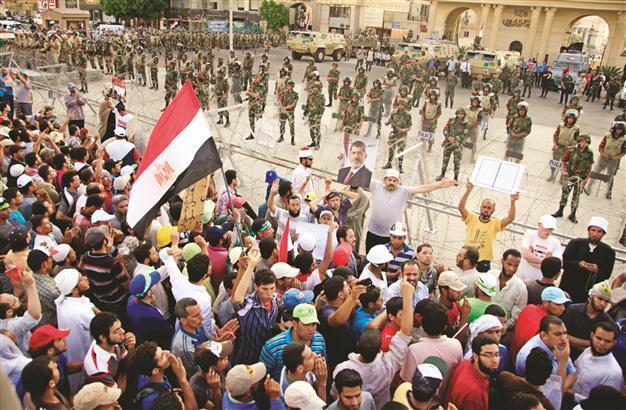Ankara acts to ease local bosses’ Egypt concerns
ISTANBUL - Hürriyet

Supporters of Egypt’s ousted President Mohamed Morsi protest in front of the Republican Guard headquarters.
The Turkish government has started taking measures against potential damage to Turkish business circles during the ongoing political crisis in Egypt.The Economy Ministry has created an “Egypt Surveillance Desk” that will deal with jittery Turkish businesspeople’s concerns over the deepening instability in the country after the recent military coup.
The desk is aimed at answering the questions of businesspeople, exporters and transport companies and detecting possible problems regarding their business in Egypt.
A telephone line and an e-mail account, through which Turkish investors can directly obtain necessary information, has been opened, the ministry said in a statement.
Turkish businesspeople have $2 billion worth of foreign direct investments in the country and have exported over $1.7 billion in 2012.
The desk will collect information and will contact the related agencies in order to prevent potential damage to Turkish businesspeople operating in the coup-hit country.
Moreover, Deputy Economy Minister Mustafa Sever will hold a meeting tomorrow with public and private actors, aiming to handle the obstacles in front of business and to found a road map about possible future steps.
Despite the soaring concerns as the political tension is not easing, Turkish investors and government officials are remaining calm and trying to avoid rush decisions without being able to comprehend the next step.
“I think the problematic situation in Egypt will continue for a while longer. However, it’s out of question for Turkish investors to quit Egypt in medium and long term,” said Rona Yılcalı, CEO of the Foreign Economic Relations Board (DEİK).
She emphasized that abandoning the facilities built with huge investments was not on the table of investors for now.
Further support for Syria, Libya damages
The government and businesspeople are now more experienced in dealing with economic consequences of political unrests following the Syrian and Libyan cases, according to Yılcalı. “We will show the reflex for our business people in Egypt as we’ve done Libya and Syria before,” she said.
Turkey’s construction sector, which has been positioning itself as a key player in the developing economies of the near geography, was hit hard during the political crisis in Libya in 2011, with many forced to leave their projects unfinished.
Around 100 Turkish contractors are owed some $20 billion in back payments and compensation for their losses in the Libyan civil war and the government has been pushing the Libyan government by political means, pledging support to damaged bosses.
The ongoing political turmoil in Syria forced Turkish businessman to withdraw from the country and exporters to scale down shipping. The Turkish economy minister announced the latest support of the government to local bosses affected by political circumstances abroad.
Eximbank’s construction loans for Libya and Syria will be given a lower interest rate, Çağlayan said on July 6. In the longer term borrowers will be able to restructure the terms of loans as their validity has been extended to the end of 2014,from September 2013. In new scheme, during the non-paid period, no capital or interest rate will be collected for a maximum 18 months.
















